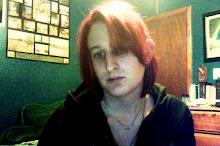
A while ago my friend Lori (of Lori’s Revival) asked the following: What does it mean to be a woman? What follows are my new-initial thoughts on this question; I may very well have to revisit this topic down the road. While I’m a little late in joining the discourse, my tardiness has not been for lack of interest or attention. Frankly, when I first sat down to write responses I was struck by the rather disconcerting realization that I didn’t really know what it meant to be a woman (or a man, for that matter). It’s not so much that I don’t have opinions on what constitute men and women—the problem comes from attempting to distil an objective definition of these two particular genders (already making the assumption that any answer I compose will be set in a U.S. mindset, as different cultures have different gender schemes). The problem with finding any one objective description is that our ideas of men and women will unfailingly be conflated with assumptions of sex, biologically based sex behaviours, sociological assumptions, popular gender roles;, and many of these assessments assume that the gender binary is not only in play, but an accurate dictator of essential qualities of men and women.
As I’m writing this you have to understand that I’m listening to Joan Jett; generally the music I listen to may influence the overall tone of my posts, but tonight the artist plays a more significant role. Joan Jett (along with a couple of girls I knew growing up) greatly shaped the woman I have become. From them I got my mixture of easy-going, coffee-shop lesbian, queer punk rocker style that makes up my feminine tomboy gender expression. From them I learned that I could be a girl and still be empowered, intelligent, in control of my body and sexuality—that I could write my own destiny. Own my weakness and my strength. To directly quote Joan, herself:
I know I’m a woman and I love being a woman and I embrace it, but I don’t embrace the roles that people have carved out that a woman could be. Personally, I’m more comfortable in boy’s clothes because they don’t make good girls clothes and they don’t make them strong. I guess you can say that I like to blur the lines a bit, and that is what androgynous means to me, it’s saying that we both have male and female within us and to embrace those energies.
And that pretty much sums up my ambivalence about this topic. I can easily discuss the social roles that women are expected to embody—but those narrow niches are not what it means to be a woman. No, being a woman, like being a man, is something much more intangible; it’s a way of thinking—it’s an energy that we emit like an aura. A girl can be strong, dominant, and powerful while not compromising her femininity. One of my favourite quotes comes from Elizabeth Wurtzel, the author of Bitch and Prozac Nation:
The biggest problem that women have is being ambivalent about their own power, ... We should be comfortable with the idea of wielding power. We shouldn't feel that it detracts from our femininity.
The moments I’ve felt the most like a girl have been some of the most banal I can recall. That’s not to suggest that being a girl is boring or commonplace; rather, the moments that I was not trying to abstract or intellectualize things—those moments when I just lived my life fully—were the moments I felt most connected to myself as a girl. Most nights driving for Women’s Transit were nights that I felt distinctly like a woman—and a woman in control. I would be hanging out in the car, blasting some of the greatest music of any generation: easy going. Of all the drivers and dispatch, I was among the most distinct and recognizable, having my own call sign and witty/sarcastic rapport with the other volunteers. Driving those cars with the radio clipped to the belt of my skirt/pants, I felt like the height of feminine badassery.
Every time that I really get into playing the violin, I feel like a woman. I get my whole body into the act, using the full weight of my arm to pull the bow, curving my body into each note—when my whole body is engaged I’m the most connected to my own femininity—I channel that feminine energy and amplify it through my music. I think Joan Jett does something very similar.
See, being a woman, to me, is being able to take control of my own life. It’s being a badass, having great reserves of strength and power, ambition and talent. It is empathy and sympathy—being in touch with the emotional and sensitive side of ourselves and our relationships. Being a woman is being able to tattoo your arms, pierce your cartilage (and not cry), dye your hair funky colors, and then put on a skirt and a flower top (with Dr. Marten boots, of course). Being a woman, to me, is an empowering embodiment of my own feminine gender, even if it might not always be expressed in the most typical ways.
Photo of Joan Jett taken from http://www.dickdestiny.com/rokkkk.JPG

Thanks for sharing. You had me at "...having great reserves of strength and power."
ReplyDeleteNever done typical, too late to start now.
ReplyDeleteCaroline xx
haha, Caroline, typical is boring. Lori, I love that I had you...by the end of the post. ;P blah...I can't write coherently tonight. It's time for sleep.
ReplyDeleteI like this. I love seeing people scratch their heads over this question. It sure got me doing it. There's really no way a trans woman could be a typical woman. Whatever that is.
ReplyDeleteIt reminded me that one of the best things about being a woman is the freedom to freely express ourselves. Great post!